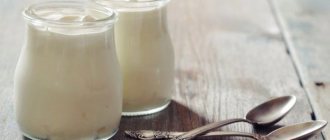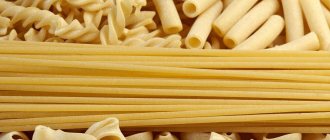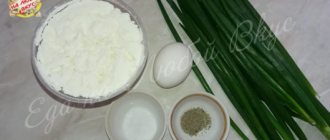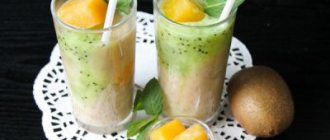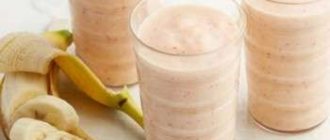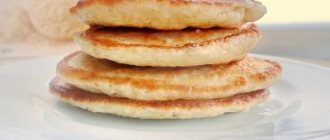When forming a dietary diet, most people prefer to use low-fat versions of milk, cottage cheese and kefir. A rare person who wants to get rid of hated extra pounds will include high-calorie yogurt with sugar and other additives in his daily diet.
But live homemade yogurt does not contain sugar or chemical preservatives! Therefore, if you decide to go on a diet, you can safely include this delicious product in your diet menu, but on the condition that you cook it yourself every day or buy only a natural product without additives.
Calorie content of drinking yoghurt. Chemical composition and nutritional value.
Nutritional value and chemical composition of “Drinking Yogurt”.
The table shows the nutritional content (calories, proteins, fats, carbohydrates, vitamins and minerals) per 100 grams of edible portion.
| Nutrient | Quantity | Norm** | % of the norm in 100 g | % of the norm in 100 kcal | 100% normal |
| Calorie content | 64 kcal | 1684 kcal | 3.8% | 5.9% | 2631 g |
| Squirrels | 3 g | 76 g | 3.9% | 6.1% | 2533 g |
| Fats | 1 g | 56 g | 1.8% | 2.8% | 5600 g |
| Carbohydrates | 10.7 g | 219 g | 4.9% | 7.7% | 2047 g |
The energy value of drinking yoghurt is 64 kcal.
Primary Source: Created in the application by the user. Read more.
** This table shows the average levels of vitamins and minerals for an adult. If you want to know the norms taking into account your gender, age and other factors, then use the “My Healthy Diet” application.
Proper nutrition with yogurt on a diet
What is the most useful yogurt diet for weight loss?
The main requirement: do not sit on a mono-diet that involves eating exclusively yogurt for several days. Yes, in terms of the number of calories, your diet will be dietary, but the risk of causing irreparable damage to your health is very high. However, this warning applies to any mono-diet.
You can safely add yoghurts to other dietary products to improve their taste.
Calorie content of drinking yoghurt. Chemical composition and nutritional value.
| Nutrient | Quantity | Norm** | % of the norm in 100 g | % of the norm in 100 kcal | 100% normal |
| Calorie content | 65 kcal | 1684 kcal | 3.9% | 6% | 2591 g |
| Squirrels | 2.9 g | 76 g | 3.8% | 5.8% | 2621 g |
| Fats | 0.1 g | 56 g | 0.2% | 0.3% | 56000 g |
| Carbohydrates | 13.1 g | 219 g | 6% | 9.2% | 1672 g |
| Water | 84.82 g | 2273 g | 3.7% | 5.7% | 2680 g |
| Ash | 0.68 g | ~ | |||
| Vitamins | |||||
| Vitamin A, RE | 178 mcg | 900 mcg | 19.8% | 30.5% | 506 g |
| Retinol | 0.178 mg | ~ | |||
| beta carotene | 0.003 mg | 5 mg | 0.1% | 0.2% | 166667 g |
| Vitamin B1, thiamine | 0.03 mg | 1.5 mg | 2% | 3.1% | 5000 g |
| Vitamin B2, riboflavin | 0.21 mg | 1.8 mg | 11.7% | 18% | 857 g |
| Vitamin B4, choline | 15.2 mg | 500 mg | 3% | 4.6% | 3289 g |
| Vitamin B5, pantothenic | 0.38 mg | 5 mg | 7.6% | 11.7% | 1316 g |
| Vitamin B6, pyridoxine | 0.06 mg | 2 mg | 3% | 4.6% | 3333 g |
| Vitamin B9, folates | 22 mcg | 400 mcg | 5.5% | 8.5% | 1818 |
| Vitamin B12, cobalamin | 0.31 mcg | 3 mcg | 10.3% | 15.8% | 968 g |
| Vitamin C, ascorbic acid | 1.5 mg | 90 mg | 1.7% | 2.6% | 6000 g |
| Vitamin D, calciferol | 1.1 mcg | 10 mcg | 11% | 16.9% | 909 g |
| Vitamin D3, cholecalciferol | 1.1 mcg | ~ | |||
| Vitamin E, alpha tocopherol, TE | 0.06 mg | 15 mg | 0.4% | 0.6% | 25000 g |
| Vitamin K, phylloquinone | 1.2 mcg | 120 mcg | 1% | 1.5% | 10000 g |
| Vitamin RR, NE | 0.105 mg | 20 mg | 0.5% | 0.8% | 19048 |
| Macronutrients | |||||
| Potassium, K | 154 mg | 2500 mg | 6.2% | 9.5% | 1623 g |
| Calcium, Ca | 119 mg | 1000 mg | 11.9% | 18.3% | 840 g |
| Magnesium, Mg | 11 mg | 400 mg | 2.8% | 4.3% | 3636 g |
| Sodium, Na | 37 mg | 1300 mg | 2.8% | 4.3% | 3514 g |
| Phosphorus, Ph | 96 mg | 800 mg | 12% | 18.5% | 833 g |
| Microelements | |||||
| Iron, Fe | 0.04 mg | 18 mg | 0.2% | 0.3% | 45000 g |
| Manganese, Mn | 0.005 mg | 2 mg | 0.3% | 0.5% | 40000 g |
| Copper, Cu | 9 mcg | 1000 mcg | 0.9% | 1.4% | 11111 g |
| Selenium, Se | 3.6 mcg | 55 mcg | 6.5% | 10% | 1528 g |
| Zinc, Zn | 0.44 mg | 12 mg | 3.7% | 5.7% | 2727 g |
| Digestible carbohydrates | |||||
| Mono- and disaccharides (sugars) | 9.21 g | max 100 g | |||
| Galactose | 0.63 g | ~ | |||
| Lactose | 3.23 g | ~ | |||
| Sucrose | 5.34 g | ~ | |||
| Sterols (sterols) | |||||
| Cholesterol | 5 mg | max 300 mg | |||
| Fatty acid | |||||
| Trans fats | 0.03 g | max 1.9 g | |||
| monounsaturated trans fats | 0.025 g | ~ | |||
| Saturated fatty acids | |||||
| Saturated fatty acids | 0.533 g | max 18.7 g | |||
| 4:0 Oil | 0.024 g | ~ | |||
| 6:0 Kapronovaya | 0.013 g | ~ | |||
| 8:0 Caprylic | 0.006 g | ~ | |||
| 10:0 Kaprinovaya | 0.018 g | ~ | |||
| 12:0 Lauric | 0.023 g | ~ | |||
| 14:0 Miristinovaya | 0.084 g | ~ | |||
| 15:0 Pentadecane | 0.01 g | ~ | |||
| 16:0 Palmitinaya | 0.253 g | ~ | |||
| 17:0 Margarine | 0.005 g | ~ | |||
| 18:0 Stearic | 0.095 g | ~ | |||
| 20:0 Arakhinovaya | 0.002 g | ~ | |||
| Monounsaturated fatty acids | 0.262 g | min 16.8 g | 1.6% | 2.5% | |
| 14:1 Myristoleic | 0.009 g | ~ | |||
| 16:1 Palmitoleic | 0.017 g | ~ | |||
| 16:1 cis | 0.014 g | ~ | |||
| 16:1 trans | 0.003 g | ~ | |||
| 17:1 Heptadecene | 0.002 g | ~ | |||
| 18:1 Oleic (omega-9) | 0.231 g | ~ | |||
| 18:1 cis | 0.209 g | ~ | |||
| 18:1 trans | 0.022 g | ~ | |||
| 20:1 Gadoleic (omega-9) | 0.003 g | ~ | |||
| Polyunsaturated fatty acids | 0.041 g | from 11.2 to 20.6 g | 0.4% | 0.6% | |
| 18:2 Linolevaya | 0.033 g | ~ | |||
| 18:2 trans isomer, undetermined | 0.006 g | ~ | |||
| 18:2 Omega-6, cis, cis | 0.022 g | ~ | |||
| 18:2 Conjugated linoleic acid | 0.005 g | ~ | |||
| 18:3 Linolenic | 0.005 g | ~ | |||
| 18:3 Omega-3, alpha-linolenic | 0.005 g | ~ | |||
| 20:3 Eicosatriene | 0.001 g | ~ | |||
| 20:3 Omega-6 | 0.001 g | ~ | |||
| 20:4 Arachidonic | 0.002 g | ~ | |||
| Omega-3 fatty acids | 0.006 g | from 0.9 to 3.7 g | 0.7% | 1.1% | |
| 22:5 Docosapentaenoic acid (DPA), Omega-3 | 0.001 g | ~ | |||
| Omega-6 fatty acids | 0.025 g | from 4.7 to 16.8 g | 0.5% | 0.8% |
Results
Yogurt is a low-calorie product that improves intestinal function, rids the body of toxins and waste, removes heaviness in the stomach and improves mood. The fermented milk product helps girls and women lose weight and saturates the body with useful substances.
Athletes include yogurt in their diet because it contains easily digestible protein, which is necessary to maintain muscle tone. The most beneficial is drinking homemade homemade yogurt. Natural and Greek yogurts are more similar to kefir, but with added sugar and flavorings.
Rate the material
Share:
Calorie content of drinking yoghurt. Chemical composition and nutritional value.
Nutritional value and chemical composition of “Drinking Yogurt”.
The table shows the nutritional content (calories, proteins, fats, carbohydrates, vitamins and minerals) per 100 grams of edible portion.
| Nutrient | Quantity | Norm** | % of the norm in 100 g | % of the norm in 100 kcal | 100% normal |
| Calorie content | 74 kcal | 1684 kcal | 4.4% | 5.9% | 2276 g |
| Squirrels | 2.8 g | 76 g | 3.7% | 5% | 2714 g |
| Fats | 2.5 g | 56 g | 4.5% | 6.1% | 2240 g |
| Carbohydrates | 10 g | 219 g | 4.6% | 6.2% | 2190 g |
| Water | 75.4 g | 2273 g | 3.3% | 4.5% | 3015 g |
| Ash | 1 g | ~ | |||
| Vitamins | |||||
| Vitamin A, RE | 2 mcg | 900 mcg | 0.2% | 0.3% | 45000 g |
| Retinol | 0.002 mg | ~ | |||
| beta carotene | 0.004 mg | 5 mg | 0.1% | 0.1% | 125000 g |
| Lutein + Zeaxanthin | 8 mcg | ~ | |||
| Vitamin B1, thiamine | 0.04 mg | 1.5 mg | 2.7% | 3.6% | 3750 g |
| Vitamin B2, riboflavin | 0.18 mg | 1.8 mg | 10% | 13.5% | 1000 g |
| Vitamin B4, choline | 16.4 mg | 500 mg | 3.3% | 4.5% | 3049 g |
| Vitamin B6, pyridoxine | 0.04 mg | 2 mg | 2% | 2.7% | 5000 g |
| Vitamin B9, folates | 9 mcg | 400 mcg | 2.3% | 3.1% | 4444 g |
| Vitamin B12, cobalamin | 0.47 mcg | 3 mcg | 15.7% | 21.2% | 638 g |
| Vitamin C, ascorbic acid | 0.7 mg | 90 mg | 0.8% | 1.1% | 12857 g |
| Vitamin E, alpha tocopherol, TE | 0.06 mg | 15 mg | 0.4% | 0.5% | 25000 g |
| Vitamin K, phylloquinone | 1.1 mcg | 120 mcg | 0.9% | 1.2% | 10909 g |
| Vitamin RR, NE | 0.1 mg | 20 mg | 0.5% | 0.7% | 20000 g |
| Betaine | 0.7 mg | ~ | |||
| Macronutrients | |||||
| Potassium, K | 194 mg | 2500 mg | 7.8% | 10.5% | 1289 g |
| Calcium, Ca | 152 mg | 1000 mg | 15.2% | 20.5% | 658 g |
| Magnesium, Mg | 15 mg | 400 mg | 3.8% | 5.1% | 2667 g |
| Sodium, Na | 58 mg | 1300 mg | 4.5% | 6.1% | 2241 g |
| Phosphorus, Ph | 119 mg | 800 mg | 14.9% | 20.1% | 672 g |
| Microelements | |||||
| Iron, Fe | 0.07 mg | 18 mg | 0.4% | 0.5% | 25714 g |
| Manganese, Mn | 0.035 mg | 2 mg | 1.8% | 2.4% | 5714 g |
| Copper, Cu | 11 mcg | 1000 mcg | 1.1% | 1.5% | 9091 g |
| Selenium, Se | 6 mcg | 55 mcg | 10.9% | 14.7% | 917 g |
| Zinc, Zn | 0.74 mg | 12 mg | 6.2% | 8.4% | 1622 g |
| Digestible carbohydrates | |||||
| Mono- and disaccharides (sugars) | 19 g | max 100 g | |||
| Essential amino acids | |||||
| Arginine* | 0.151 g | ~ | |||
| Valin | 0.407 g | ~ | |||
| Histidine* | 0.122 g | ~ | |||
| Isoleucine | 0.269 g | ~ | |||
| Leucine | 0.496 g | ~ | |||
| Lysine | 0.439 g | ~ | |||
| Methionine | 0.145 g | ~ | |||
| Threonine | 0.202 g | ~ | |||
| Tryptophan | 0.028 g | ~ | |||
| Phenylalanine | 0.27 g | ~ | |||
| Nonessential amino acids | |||||
| Alanin | 0.212 g | ~ | |||
| Aspartic acid | 0.394 g | ~ | |||
| Glycine | 0.121 g | ~ | |||
| Glutamic acid | 0.966 g | ~ | |||
| Proline | 0.581 g | ~ | |||
| Serin | 0.305 g | ~ | |||
| Tyrosine | 0.247 g | ~ | |||
| Cysteine | 0.045 g | ~ | |||
| Sterols (sterols) | |||||
| Cholesterol | 2 mg | max 300 mg | |||
| Saturated fatty acids | |||||
| Saturated fatty acids | 0.119 g | max 18.7 g | |||
| 4:0 Oil | 0.009 g | ~ | |||
| 6:0 Kapronovaya | 0.001 g | ~ | |||
| 8:0 Caprylic | 0.002 g | ~ | |||
| 10:0 Kaprinovaya | 0.004 g | ~ | |||
| 12:0 Lauric | 0.003 g | ~ | |||
| 14:0 Miristinovaya | 0.017 g | ~ | |||
| 16:0 Palmitinaya | 0.055 g | ~ | |||
| 18:0 Stearic | 0.019 g | ~ | |||
| Monounsaturated fatty acids | 0.05 g | min 16.8 g | 0.3% | 0.4% | |
| 16:1 Palmitoleic | 0.007 g | ~ | |||
| 18:1 Oleic (omega-9) | 0.041 g | ~ | |||
| Polyunsaturated fatty acids | 0.016 g | from 11.2 to 20.6 g | 0.1% | 0.1% | |
| 18:2 Linolevaya | 0.01 g | ~ | |||
| 18:3 Linolenic | 0.006 g | ~ | |||
| Omega-3 fatty acids | 0.006 g | from 0.9 to 3.7 g | 0.7% | 0.9% | |
| Omega-6 fatty acids | 0.01 g | from 4.7 to 16.8 g | 0.2% | 0.3% |
The energy value of drinking yoghurt is 74 kcal.
Primary Source: Created in the application by the user. Read more.
** This table shows the average levels of vitamins and minerals for an adult. If you want to know the norms taking into account your gender, age and other factors, then use the “My Healthy Diet” application.
Possible harm
High-quality, “live” yogurt with a short shelf life cannot cause harm, except in cases of lactose intolerance or individual components present in the product. For example, people with hypersensitivity to strawberries should not buy yoghurts with pieces or juice of this berry.
For some acute and chronic diseases, the use of yogurt should be agreed with your doctor. Such pathologies include:
- diarrhea;
- gastritis with high acidity;
- stomach or intestinal ulcer;
- diseases of the kidneys and genitourinary system;
- diabetes.
As research results show, manufacturers often lie and present false information on packaging:
- several times overestimate the number of beneficial bacteria;
- do not specify the composition and origin of the raw materials used;
- they add harmful flavors, dyes, starch, stabilizers and preservatives, many of which have carcinogenic properties.
Therefore, all products with a shelf life of more than 14 days must be treated with caution - even if they do not cause harm to the body, they will not bring any particular benefit.
When buying yogurts, you need to pay attention not only to the expiration date, but also to the condition of the packaging: a swollen lid indicates that a fermentation process is taking place inside, caused by non-compliance with storage conditions.
Eating such a delicacy can lead to dire consequences - diarrhea and food poisoning.
Calorie content of drinking yoghurt. Chemical composition and nutritional value.
Nutritional value and chemical composition of “Drinking Yogurt”.
The table shows the nutritional content (calories, proteins, fats, carbohydrates, vitamins and minerals) per 100 grams of edible portion.
| Nutrient | Quantity | Norm** | % of the norm in 100 g | % of the norm in 100 kcal | 100% normal |
| Calorie content | 71.6 kcal | 1684 kcal | 4.3% | 6% | 2352 g |
| Squirrels | 2.9 g | 76 g | 3.8% | 5.3% | 2621 g |
| Fats | 2 g | 56 g | 3.6% | 5% | 2800 g |
| Carbohydrates | 10.5 g | 219 g | 4.8% | 6.7% | 2086 g |
| Organic acids | 0.8 g | ~ | |||
| Water | 81 g | 2273 g | 3.6% | 5% | 2806 g |
| Ash | 0.7 g | ~ | |||
| Vitamins | |||||
| Vitamin B1, thiamine | 0.03 mg | 1.5 mg | 2% | 2.8% | 5000 g |
| Vitamin B2, riboflavin | 0.13 mg | 1.8 mg | 7.2% | 10.1% | 1385 g |
| Vitamin B4, choline | 15.8 mg | 500 mg | 3.2% | 4.5% | 3165 g |
| Vitamin B5, pantothenic | 0.2 mg | 5 mg | 4% | 5.6% | 2500 g |
| Vitamin B6, pyridoxine | 0.025 mg | 2 mg | 1.3% | 1.8% | 8000 g |
| Vitamin B9, folates | 3 mcg | 400 mcg | 0.8% | 1.1% | 13333 g |
| Vitamin B12, cobalamin | 0.2 mcg | 3 mcg | 6.7% | 9.4% | 1500 g |
| Vitamin C, ascorbic acid | 1.6 mg | 90 mg | 1.8% | 2.5% | 5625 g |
| Vitamin D, calciferol | 0.018 mcg | 10 mcg | 0.2% | 0.3% | 55556 g |
| Vitamin H, biotin | 3.2 mcg | 50 mcg | 6.4% | 8.9% | 1563 g |
| Vitamin K, phylloquinone | 0.1 mcg | 120 mcg | 0.1% | 0.1% | 120000 g |
| Vitamin RR, NE | 0.9 mg | 20 mg | 4.5% | 6.3% | 2222 g |
| Macronutrients | |||||
| Potassium, K | 123 mg | 2500 mg | 4.9% | 6.8% | 2033 |
| Calcium, Ca | 109 mg | 1000 mg | 10.9% | 15.2% | 917 g |
| Magnesium, Mg | 13 mg | 400 mg | 3.3% | 4.6% | 3077 g |
| Sodium, Na | 45 mg | 1300 mg | 3.5% | 4.9% | 2889 g |
| Sera, S | 30 mg | 1000 mg | 3% | 4.2% | 3333 g |
| Phosphorus, Ph | 85 mg | 800 mg | 10.6% | 14.8% | 941 g |
| Chlorine, Cl | 100 mg | 2300 mg | 4.3% | 6% | 2300 g |
| Microelements | |||||
| Aluminium, Al | 50 mcg | ~ | |||
| Iron, Fe | 0.1 mg | 18 mg | 0.6% | 0.8% | 18000 g |
| Yod, I | 9 mcg | 150 mcg | 6% | 8.4% | 1667 g |
| Cobalt, Co | 0.9 mcg | 10 mcg | 9% | 12.6% | 1111 g |
| Manganese, Mn | 0.005 mg | 2 mg | 0.3% | 0.4% | 40000 g |
| Copper, Cu | 12 mcg | 1000 mcg | 1.2% | 1.7% | 8333 g |
| Molybdenum, Mo | 5 mcg | 70 mcg | 7.1% | 9.9% | 1400 g |
| Tin, Sn | 15 mcg | ~ | |||
| Selenium, Se | 1 mcg | 55 mcg | 1.8% | 2.5% | 5500 g |
| Strontium, Sr | 17 mcg | ~ | |||
| Fluorine, F | 20 mcg | 4000 mcg | 0.5% | 0.7% | 20000 g |
| Chromium, Cr | 2 mcg | 50 mcg | 4% | 5.6% | 2500 g |
| Zinc, Zn | 0.4 mg | 12 mg | 3.3% | 4.6% | 3000 g |
| Sterols (sterols) | |||||
| Cholesterol | 4.5 mg | max 300 mg | |||
| Saturated fatty acids | |||||
| Saturated fatty acids | 1.05 g | max 18.7 g | |||
| Monounsaturated fatty acids | 0.45 g | min 16.8 g | 2.7% | 3.8% | |
| Polyunsaturated fatty acids | 0.07 g | from 11.2 to 20.6 g | 0.6% | 0.8% | |
| Omega-3 fatty acids | 0.015 g | from 0.9 to 3.7 g | 1.7% | 2.4% | |
| Omega-6 fatty acids | 0.045 g | from 4.7 to 16.8 g | 1% | 1.4% |
The energy value of drinking yoghurt is 71.6 kcal.
Primary Source: Created in the application by the user. Read more.
** This table shows the average levels of vitamins and minerals for an adult. If you want to know the norms taking into account your gender, age and other factors, then use the “My Healthy Diet” application.
Beneficial features
The beneficial properties of yoghurts with a shelf life longer than 2 weeks are questionable. To prevent the fermented milk product from spoiling, all kinds of preservatives are added to it, which not only prevent the proliferation of pathogenic microorganisms, but also neutralize beneficial bifidobacteria and lactobacilli.
The health benefits of yoghurts for children and adults directly depend on the amount of components used in the composition. All of the qualities listed below apply to home-made products or those that require short-term storage - no more than 5-14 days.
Traditional yoghurts without preservatives have a beneficial effect on various organs and systems of the human body:
- normalize the functioning of the gastrointestinal tract;
- improve digestion of food and absorption of nutrients into the systemic bloodstream;
- suppress the growth of pathogenic microflora;
- prevent the development of dysbacteriosis, flatulence and bloating;
- strengthen general immunity and increase the body’s resistance to infectious agents - fungi, bacteria and viruses;
- reduce the risk of developing hemorrhoids and colon cancer;
- activate metabolic processes;
- promote rapid weight loss (with a properly formulated diet and following the recommendations of a nutritionist);
- saturate the body with calcium, necessary for the strength of bones and teeth.
It is worth noting that the fermented protein contained in yogurt is absorbed by the digestive system much easier and faster than the protein of fresh cow, goat or sheep milk. Since this nutrient is necessary for building cells and maintaining all vital processes of the body, yoghurt is recommended to be given to children, the elderly and those patients who are weakened by illness or have undergone surgery.
Natural yogurt without additives is used to feed infants.
Fermented milk product without additives can be consumed not only internally - it is recommended to add it to nourishing, moisturizing and anti-aging face masks. After just a few procedures, the skin is transformed:
- sebum secretion is normalized;
- cells are restored and renewed faster;
- the epidermis is saturated with moisture and stops peeling;
- the skin acquires a healthy color and structure.
A strong argument in favor of yoghurts is, of course, their taste. Unlike kefir, fermented baked milk or yogurt, yogurt is pleasant to eat for dessert, before bed or as a snack between main meals. Even the most neutral taste of a treat can be changed at your discretion by adding fresh, canned or dried fruits, muesli, jam, fresh or concentrated juices, liquid chocolate, etc.
Yogurt can be bought not only in bottles or jars, but also in capsules. Medicinal yogurt is recommended for food allergies, atopic dermatitis, dysbiosis, acute and chronic indigestion and gastroenteritis, as well as when undergoing a course of antibiotics and chemotherapy.
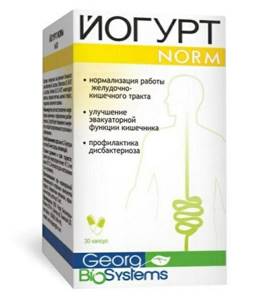
Calorie content of drinking yoghurt. Chemical composition and nutritional value.
Nutritional value and chemical composition of “Drinking Yogurt”.
The table shows the nutritional content (calories, proteins, fats, carbohydrates, vitamins and minerals) per 100 grams of edible portion.
| Nutrient | Quantity | Norm** | % of the norm in 100 g | % of the norm in 100 kcal | 100% normal |
| Calorie content | 89 kcal | 1684 kcal | 5.3% | 6% | 1892 |
| Squirrels | 2.8 g | 76 g | 3.7% | 4.2% | 2714 g |
| Fats | 2.7 g | 56 g | 4.8% | 5.4% | 2074 g |
| Carbohydrates | 13.3 g | 219 g | 6.1% | 6.9% | 1647 g |
The energy value of drinking yoghurt is 89 kcal.
Primary Source: Created in the application by the user. Read more.
** This table shows the average levels of vitamins and minerals for an adult. If you want to know the norms taking into account your gender, age and other factors, then use the “My Healthy Diet” application.
Homemade yogurt recipes
The process of preparing natural fermented milk dessert at home is greatly facilitated by a yogurt maker. All you need to do is pour milk into special cups, add starter into it and turn on the machine.
The yogurt maker maintains a special temperature regime for eight hours to prepare the product. If you set it to work overnight, then in the morning all you have to do is take the finished yogurt out of the unit, cool it and put it in the refrigerator.
But even without this convenient technology, you can prepare a delicious fermented milk dessert that is not inferior in quality to those produced industrially. The main ingredient you will need for this is a special starter, ready-made live yogurt or its capsules. They are easy to find in supermarkets and even some pharmacies.
Yogurt capsules
Using yogurt capsules without a multicooker, the product is prepared as follows:
- Boil a liter of milk and then cool it to forty degrees.
- For this amount of milk you will need two capsules. Pour the milk into a sterilized three-liter jar and pour the contents of both capsules into it.
- Then cover the jar with a lid and place it in a place with a constant warm temperature. In winter, this place can be a stool placed next to the radiator. But in the summer you can use a high-quality thermos that can maintain a constant temperature for up to four hours.
- Please note that the lower the temperature at which the yogurt is infused, the longer it will take to prepare. But, as a rule, it does not exceed twelve hours. The aging period affects the taste of the dessert: the longer it is kept, the more clearly the sourness will be present in it.
Live sourdough
A natural dessert is prepared in a similar way using live yogurt. Moreover, even the one you prepared is suitable.
- For one liter of milk you will need four tablespoons of this starter.
- It is recommended to mix it separately with 100 ml of milk before adding the entire volume of milk.
- Prepared homemade yogurt should be stored in the refrigerator for no more than four to five days.
How to make a dessert sweeter, but not increase the number of calories in it?
- You can use fresh fruit: a little banana, apricots or peaches.
- During the berry season, feel free to add raspberries and strawberries to it.
- In winter, dried fruits can be used as natural sweeteners: raisins, dates, dried apricots, prunes, dried cherries.
- It is also permissible to add jam - but just a little bit, so as not to increase the number of calories.
- In addition, you can add sweetness to the dessert using natural honey or any berry syrup.
- Top with your favorite nuts or granola if desired.
If you prefer a smooth yogurt texture, then blend it with fruit in a blender. Otherwise, just cut them into small pieces.
Master class in the microwave
An even simpler recipe for making homemade fermented milk dessert involves using a microwave oven. To make one serving, you will need the following ingredients.
| Compound | Quantity |
| any live yogurt | 65 g |
| pasteurized or boiled milk | 140 ml |
| honey, nuts, corn flakes, fruits and berries | taste |
Cooking steps:
- Place store-bought live yogurt in a glass glass, filling one third of the entire container. It is important that the glass is sterilized (hold it over a boiling kettle for a while) and then dried.
- Pour in the milk and stir well.
- Place the resulting mixture in the microwave and set to boiling for one minute.
- After this, cover the top of the glass with cling film and place it in a warm place. There he will have to stand all night.
- In the morning, place the product in the refrigerator for four hours, where it will finally thicken.
This way you have a healthy snack for lunch. If you want to improve the taste of the dish, add corn flakes, nuts, a little honey, fruits or berries - whatever you wish.
If you want to enjoy this delicious dessert the next day, then put a couple of spoons of ready-made yogurt in another glass in advance, which will become the starter.
Drinking yogurt
Fans of drinking yogurt can prepare it at home using a multicooker. You can use baked milk as a base to get an interesting creamy flavor to the finished product.
According to the recipe, you will need the following ingredients:
- milk - 1000 ml;
- sugar - 50 g;
- vanilla sugar - ½ tsp;
- live yogurt - 130 g.
How to cook?
- Pour the entire volume of milk into the multicooker and select the “simmer” mode. The milk needs to simmer in the slow cooker for six hours.
- After the required time, cool it. Pour out a glass of milk to which you want to add the starter.
- Mix both ingredients thoroughly to obtain a homogeneous mass. Pour it into the rest of the milk and stir. Add both types of sugar there.
- If you have a modern multicooker that has a special mode for making yogurt, then just choose it. Otherwise, in manual mode, set the temperature to forty degrees, and the cooking time to eight hours, and press “start”.
- When the product is ready, pour it into a jar or other convenient container and cool.
- When it has cooled, beat it a little with a mixer to get a homogeneous consistency (initially there will be a small amount of whey in it).
- You can add dark chocolate chips or other ingredients to your liking.
As a hearty breakfast, you can have yogurt with the addition of flax seeds, which are reputed to have strong antioxidants. Prepare fermented milk dessert using any of the methods described above, and grind the flax using a blender or coffee grinder. Add this flaxseed flour to the dessert and mix.
You can use ready-made flax bran, which is sold in supermarkets.
Calorie content of drinking yoghurt. Chemical composition and nutritional value.
Nutritional value and chemical composition of “Drinking Yogurt”.
The table shows the nutritional content (calories, proteins, fats, carbohydrates, vitamins and minerals) per 100 grams of edible portion.
| Nutrient | Quantity | Norm** | % of the norm in 100 g | % of the norm in 100 kcal | 100% normal |
| Calorie content | 89 kcal | 1684 kcal | 5.3% | 6% | 1892 |
| Squirrels | 2.8 g | 76 g | 3.7% | 4.2% | 2714 g |
| Fats | 2.7 g | 56 g | 4.8% | 5.4% | 2074 g |
| Carbohydrates | 13.3 g | 219 g | 6.1% | 6.9% | 1647 g |
The energy value of drinking yoghurt is 89 kcal.
Primary Source: Created in the application by the user. Read more.
** This table shows the average levels of vitamins and minerals for an adult. If you want to know the norms taking into account your gender, age and other factors, then use the “My Healthy Diet” application.
Yogurt or kefir – which is better to choose?
Due to the wide range available today, it is quite difficult to make the right choice in favor of one option or another. Natural kefir, like yogurt, has many beneficial properties and is an excellent preventative and health remedy. This is a win-win option, suitable for dietary nutrition. It is also often used during periods of rehabilitation after illnesses, operations, etc.
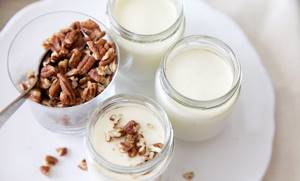
Of course, in terms of the number of kcal, kefir wins significantly, since it contains only 30-55 kcal, while in yogurt this figure can range from 60 to 150 kcal. In addition, yogurt, which contains various additives, is less beneficial for the digestive system, figure, and the body as a whole.
It is also worth noting here that fermented milk products will only be truly healthy if they are high-quality and natural. Therefore, nutritionists and doctors advise making it yourself, especially since preparing yogurt at home is not at all difficult, and the price for such an absolutely natural product will be minimal.
Calorie content of drinking yogurt (Homemade). Chemical composition and nutritional value.
| Nutrient | Quantity | Norm** | % of the norm in 100 g | % of the norm in 100 kcal | 100% normal |
| Calorie content | 68 kcal | 1684 kcal | 4% | 5.9% | 2476 g |
| Squirrels | 5 g | 76 g | 6.6% | 9.7% | 1520 g |
| Fats | 3.8 g | 56 g | 6.8% | 10% | 1474 g |
| Carbohydrates | 3.5 g | 219 g | 1.6% | 2.4% | 6257 g |
| Alcohol (ethyl alcohol) | 0.03 g | ~ | |||
| Organic acids | 1.3 g | ~ | |||
| Water | 86.3 g | 2273 g | 3.8% | 5.6% | 2634 g |
| Ash | 0.7 g | ~ | |||
| Vitamins | |||||
| Vitamin A, RE | 22 mcg | 900 mcg | 2.4% | 3.5% | 4091 g |
| Retinol | 0.02 mg | ~ | |||
| beta carotene | 0.01 mg | 5 mg | 0.2% | 0.3% | 50000 g |
| Vitamin B1, thiamine | 0.04 mg | 1.5 mg | 2.7% | 4% | 3750 g |
| Vitamin B2, riboflavin | 0.2 mg | 1.8 mg | 11.1% | 16.3% | 900 g |
| Vitamin B4, choline | 40 mg | 500 mg | 8% | 11.8% | 1250 g |
| Vitamin B5, pantothenic | 0.31 mg | 5 mg | 6.2% | 9.1% | 1613 g |
| Vitamin B6, pyridoxine | 0.05 mg | 2 mg | 2.5% | 3.7% | 4000 g |
| Vitamin B9, folates | 7.8 mcg | 400 mcg | 2% | 2.9% | 5128 g |
| Vitamin B12, cobalamin | 0.43 mcg | 3 mcg | 14.3% | 21% | 698 g |
| Vitamin C, ascorbic acid | 0.6 mg | 90 mg | 0.7% | 1% | 15000 g |
| Vitamin D, calciferol | 0.05 mcg | 10 mcg | 0.5% | 0.7% | 20000 g |
| Vitamin E, alpha tocopherol, TE | 0.07 mg | 15 mg | 0.5% | 0.7% | 21429 g |
| Vitamin H, biotin | 3.51 mcg | 50 mcg | 7% | 10.3% | 1425 g |
| Vitamin K, phylloquinone | 0.2 mcg | 120 mcg | 0.2% | 0.3% | 60000 g |
| Vitamin RR, NE | 1.4 mg | 20 mg | 7% | 10.3% | 1429 g |
| Niacin | 0.2 mg | ~ | |||
| Macronutrients | |||||
| Potassium, K | 147 mg | 2500 mg | 5.9% | 8.7% | 1701 g |
| Calcium, Ca | 122 mg | 1000 mg | 12.2% | 17.9% | 820 g |
| Magnesium, Mg | 15 mg | 400 mg | 3.8% | 5.6% | 2667 g |
| Sodium, Na | 52 mg | 1300 mg | 4% | 5.9% | 2500 g |
| Sera, S | 50 mg | 1000 mg | 5% | 7.4% | 2000 g |
| Phosphorus, Ph | 96 mg | 800 mg | 12% | 17.6% | 833 g |
| Chlorine, Cl | 100 mg | 2300 mg | 4.3% | 6.3% | 2300 g |
| Microelements | |||||
| Aluminium, Al | 50 mcg | ~ | |||
| Iron, Fe | 0.1 mg | 18 mg | 0.6% | 0.9% | 18000 g |
| Yod, I | 9 mcg | 150 mcg | 6% | 8.8% | 1667 g |
| Cobalt, Co | 1 mcg | 10 mcg | 10% | 14.7% | 1000 g |
| Manganese, Mn | 0.006 mg | 2 mg | 0.3% | 0.4% | 33333 g |
| Copper, Cu | 10 mcg | 1000 mcg | 1% | 1.5% | 10000 g |
| Molybdenum, Mo | 5 mcg | 70 mcg | 7.1% | 10.4% | 1400 g |
| Tin, Sn | 13 mcg | ~ | |||
| Selenium, Se | 2 mcg | 55 mcg | 3.6% | 5.3% | 2750 g |
| Strontium, Sr | 17 mcg | ~ | |||
| Fluorine, F | 20 mcg | 4000 mcg | 0.5% | 0.7% | 20000 g |
| Chromium, Cr | 2 mcg | 50 mcg | 4% | 5.9% | 2500 g |
| Zinc, Zn | 0.4 mg | 12 mg | 3.3% | 4.9% | 3000 g |
| Digestible carbohydrates | |||||
| Mono- and disaccharides (sugars) | 3.5 g | max 100 g | |||
| Galactose | 0.05 g | ~ | |||
| Glucose (dextrose) | 0.03 g | ~ | |||
| Lactose | 3.5 g | ~ | |||
| Essential amino acids | 2.088 g | ~ | |||
| Arginine* | 0.174 g | ~ | |||
| Valin | 0.323 g | ~ | |||
| Histidine* | 0.156 g | ~ | |||
| Isoleucine | 0.3 g | ~ | |||
| Leucine | 0.45 g | ~ | |||
| Lysine | 0.387 g | ~ | |||
| Methionine | 0.115 g | ~ | |||
| Methionine + Cysteine | 0.17 g | ~ | |||
| Threonine | 0.216 g | ~ | |||
| Tryptophan | 0.072 g | ~ | |||
| Phenylalanine | 0.225 g | ~ | |||
| Phenylalanine+Tyrosine | 0.47 g | ~ | |||
| Nonessential amino acids | 2.912 g | ~ | |||
| Alanin | 0.16 g | ~ | |||
| Aspartic acid | 0.344 g | ~ | |||
| Glycine | 0.093 g | ~ | |||
| Glutamic acid | 0.897 g | ~ | |||
| Proline | 0.518 g | ~ | |||
| Serin | 0.278 g | ~ | |||
| Tyrosine | 0.242 g | ~ | |||
| Cysteine | 0.05 g | ~ | |||
| Sterols (sterols) | |||||
| Cholesterol | 9 mg | max 300 mg | |||
| Saturated fatty acids | |||||
| Saturated fatty acids | 2 g | max 18.7 g | |||
| 4:0 Oil | 0.1 g | ~ | |||
| 6:0 Kapronovaya | 0.07 g | ~ | |||
| 8:0 Caprylic | 0.04 g | ~ | |||
| 10:0 Kaprinovaya | 0.08 g | ~ | |||
| 12:0 Lauric | 0.09 g | ~ | |||
| 14:0 Miristinovaya | 0.45 g | ~ | |||
| 15:0 Pentadecane | 0.03 g | ~ | |||
| 16:0 Palmitinaya | 0.56 g | ~ | |||
| 17:0 Margarine | 0.02 g | ~ | |||
| 18:0 Stearic | 0.31 g | ~ | |||
| 20:0 Arakhinovaya | 0.04 g | ~ | |||
| Monounsaturated fatty acids | 0.97 g | min 16.8 g | 5.8% | 8.5% | |
| 14:1 Myristoleic | 0.04 g | ~ | |||
| 16:1 Palmitoleic | 0.08 g | ~ | |||
| 18:1 Oleic (omega-9) | 0.69 g | ~ | |||
| 20:1 Gadoleic (omega-9) | 0.01 g | ~ | |||
| Polyunsaturated fatty acids | 0.15 g | from 11.2 to 20.6 g | 1.3% | 1.9% | |
| 18:2 Linolevaya | 0.02 g | ~ | |||
| 18:3 Linolenic | 0.03 g | ~ | |||
| 20:4 Arachidonic | 0.08 g | ~ | |||
| Omega-3 fatty acids | 0.03 g | from 0.9 to 3.7 g | 3.3% | 4.9% | |
| Omega-6 fatty acids | 0.1 g | from 4.7 to 16.8 g | 2.1% | 3.1% |
How many calories are in Danone and Activia yoghurts?
From a wide range of yoghurts from various manufacturers, you can choose one suitable for your diet, taking into account your personal taste preferences.
Options for fermented milk products from famous brands:
- “Miracle”: 80-90 kcal, depending on the amount of fruit additives and fat content.
- “Activia”: with cereals 2.2% – 82 kcal; natural – 75 kcal.
- “Sloboda”: thick with strawberries 2.9% – 98 kcal; drinking with peach – 82 kcal.
- “Campina”: 1.2% – 52 kcal; 2.5% with peach, cherry and strawberry juice – 94 kcal.
- “Danissimo”: natural – 70 kcal; with chocolate, cereal and puffed rice - more than 100 kcal.
- “Savushkin”: Greek 2% – 63 kcal; optimal with fruit flavors – 63 kcal.
- “Danone”: with blueberries, peach or strawberries – 83 kcal.
- “Bio Balance”: 1% kefir – 41 kcal; with cereals – 75 kcal.
- “Epika”: with blood orange, pineapple, cherry – 120 kcal; with coconut and vanilla – 130 kcal.
- “Fruttis”: with a fat content of 2-3% – 70 kcal; more than 5% – 100 kcal.
When choosing yogurt, it is important to familiarize yourself with the expiration date and composition. The fewer ingredients used, the healthier the final product.
Benefits for the body
Homemade yogurt prepared without adding food colors, flavors and sugar is beneficial for the human body. The health benefits of homemade “live” fermented milk product are reflected in the following way:
- The bone skeleton, tooth enamel and nails are strengthened.
- Systematic consumption of yogurt has a general strengthening effect on the body.
- The functioning of the immune system is improved due to the microflora included in the product. In addition, yogurt can be drunk to prevent viral and colds.
- The functioning of the digestive system and intestines is normalized and improved. Metabolism is restored, bloating is reduced, and colitis is prevented.
- Regular consumption of the drink helps prevent the development of cancer of the large and small intestine.
- The number of harmful bacteria that lead to plaque on the mucous membrane is reduced, so women are recommended to drink yogurt to prevent and treat thrush.
- The amount of “bad” cholesterol in the blood decreases and the content of good cholesterol increases. To do this, you need to drink 100 g of homemade natural yogurt daily.
- The body gets rid of pathogenic microorganisms.
- The functioning of the cardiovascular system improves.
- Nerves are strengthened, mood improves and the risk of depression is prevented.
- Hormonal levels are normalized in men and women, and brain function improves.
The product contains easily digestible protein, which is necessary for athletes to properly grow muscle mass. Yogurt is used to prevent enteritis, osteoporosis, thyroid diseases and dysbacteriosis.
Natural drinking fermented milk product, like Greek, has beneficial properties similar to regular kefir, but only store-bought yogurt contains sugar and can contain various additives (fruits, berries, dyes, sweeteners, etc.). Store-bought drinks are useful for bowel function, but to a lesser extent than homemade ones.
Goat yogurt has similar health benefits and is suitable for people with cow's milk allergies. The goat milk product is almost completely absorbed by the body.
Note: Soy yogurt is suitable for people with lactose intolerance. The benefit of the product is to normalize the functioning of the gastrointestinal tract, however, the composition contains sugar, stabilizers and acidity regulators, so you should not abuse the drink.
Drinking yogurt on an empty stomach instead of breakfast is not advisable, since the body does not need additional bacteria in the morning, and therefore there will be no expected benefit from the product. It is useful to consume fermented milk product at night, as this will significantly reduce the load on the digestive system and relieve heaviness in the stomach the next day.
Product calorie analysis
Ratio of proteins, fats and carbohydrates:
- home
- Product composition
- Composition of dairy products
- Chemical composition of “Drinking yoghurt 1.5% fat, with fruit filling”
Tags:
Drinking yogurt 1.5% fat, with fruit filling, calorie content 78 kcal, chemical composition, nutritional value, vitamins, minerals, benefits Drinking yogurt 1.5% fat, with fruit filling, calories, nutrients, beneficial properties Drinking yogurt 1.5 % fat content, with fruit filling
Energy value, or calorie content
- this is the amount of energy released in the human body from food during the digestion process. The energy value of the product is measured in kilocalories (kcal) or kilojoules (kJ) per 100 grams. product. The kilocalorie used to measure the energy value of food is also called a food calorie, so when caloric content is reported in (kilo)calories, the prefix kilo is often omitted. You can see detailed energy value tables for Russian products here.
The nutritional value
— content of carbohydrates, fats and proteins in the product.
Nutritional value of food product
- a set of properties of a food product, in the presence of which the physiological needs of a person for the necessary substances and energy are satisfied.
Vitamins
, organic substances required in small quantities in the diet of both humans and most vertebrates. Vitamin synthesis is usually carried out by plants, not animals. A person's daily requirement for vitamins is only a few milligrams or micrograms. Unlike inorganic substances, vitamins are destroyed by strong heat. Many vitamins are unstable and are “lost” during cooking or food processing.
source
Yogurt with additives
Not everyone likes natural; for many, its taste is unusual and is more comparable to sour cream or fresh kefir. It is not sweet, therefore it has less calories, but it is not as popular as a similar product with sugar and other additional ingredients. It’s easy to calculate how many calories are in yogurt without additives; in other cases, you just have to rely on the honesty of the manufacturer, since its composition looks somewhat complicated for the average consumer. The benefits from it will definitely be less than from natural ones, since along with milk and sourdough there are preservatives, dyes, flavors and, of course, sugar. Experts on this issue state that this product contains approximately twice as many calories as homemade yogurt.
